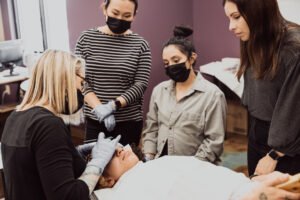Is Permanent Eye Makeup Safe? Understanding Adverse Effects
As the beauty industry continues to evolve, permanent makeup has become an increasingly popular option for those seeking to enhance their natural beauty without the need for daily makeup application. At Cameo College, we understand the allure of simplifying your beauty routine with permanent solutions like tattoos and permanent makeup. However, potential students often ask: is permanent eye makeup safe? It’s essential to understand the benefits, potential adverse effects, and what to expect from permanent makeup procedures before making a decision.
Introduction to Permanent Makeup

Permanent makeup, also known as micropigmentation, involves depositing pigment into the skin to mimic the appearance of traditional makeup. This cosmetic procedure can be used for various purposes, such as:
- Enhancing eyebrows
- Applying permanent eyeliner
- Camouflaging scars
While the prospect of reducing allergies to traditional makeup and saving time is appealing, it is crucial to consider the type of pigment used and the expertise of the tattoo artists performing these procedures. It’s always recommended to undergo a thorough consultation to ensure that permanent makeup is generally safe for your skin type.
What is Permanent Makeup?
Permanent makeup is a form of tattooing where pigment is applied to the skin to create the appearance of makeup. Techniques such as microblading for brows or permanent eyeliner are common examples. The process involves tattoo artists using specialized tools to deposit ink into the dermal layer of the skin. Despite its name, permanent makeup may require touch-ups over time due to natural fading. As with any cosmetic tattoo, it’s important to consider factors like hygiene and aftercare instructions to reduce the risk of infection and other adverse events.
Overview of Permanent Eye Makeup
Permanent eye makeup, including procedures like permanent eyeliner, offers a solution for individuals looking to have defined eyes without the hassle of daily makeup application. This form of cosmetic tattoo involves depositing pigment into the sensitive skin of the eyelid, requiring skilled application to avoid adverse effects such as swelling or burning. While permanent eye makeup can be a convenient option, it is vital to conduct a patch test beforehand to identify any potential allergic reactions. Understanding the risks and benefits can help in determining if permanent makeup is safe for you.
Benefits of Permanent Makeup
One of the primary advantages of permanent makeup is the time-saving aspect, freeing individuals from the daily routine of applying makeup. Additionally, it offers a solution for those experiencing hair loss or allergies to traditional makeup. Permanent makeup can enhance natural beauty by providing a polished look with minimal effort. The procedure can also be tailored to suit various skin types, making it a versatile option. However, it is essential to weigh these benefits against potential adverse reactions and consult with professionals to ensure that your choice aligns with your personal and medical needs.
Safety of Permanent Makeup

Photo by Gabe Pierce on Unsplash
Is Permanent Makeup Safe?
At Cameo College, we prioritize educating our students on the safety aspects of permanent makeup to ensure they can provide the best service to future clients. Permanent makeup is generally considered safe, especially when carried out by trained tattoo artists under hygienic conditions. However, like any cosmetic procedure, it comes with potential risks, such as allergic reactions or infections. It is important to understand that these procedures involve depositing pigment into the skin, which may not be suitable for everyone, especially those with sensitive skin or certain medical conditions. Thorough research and adherence to aftercare instructions are essential to minimize potential adverse effects.
Factors Influencing Safety
The safety of permanent makeup can be influenced by several factors, which include:
- The quality of tattoo inks
- The artist’s expertise
- The client’s skin type
For instance, certain pigmentation techniques, such as microblading, require precision to avoid adverse reactions like granuloma or keloid formation. Additionally, clients with a history of allergies to traditional makeup should undergo a patch test to identify any potential reactions to the pigments used. Ensuring the procedure is performed in a sterile environment reduces the risk of infection and other complications, making permanent makeup safe for a wider audience.
Consultation and Preparation
A thorough consultation is a crucial step in the preparation for permanent makeup procedures. During this stage, potential clients can discuss their goals, explore how the procedure can meet their expectations, and assess their suitability based on skin type and medical history. Tattoo artists will also evaluate the treated area to determine the best approach and identify any potential risks. Educating clients on the importance of proper preparation, including avoiding certain activities or products before the procedure, can significantly impact the outcome and safety of the permanent makeup application. This proactive approach ensures both artists and clients are well-prepared, enhancing the overall safety and success of the procedure.
Understanding Adverse Effects

Photo by Rafael Garcin on Unsplash
Common Adverse Reactions
Permanent makeup procedures, while generally safe, can result in some common adverse reactions. These may include redness, swelling, and mild discomfort around the treated area, particularly the eyelid where permanent eyeliner is applied. Some individuals may experience allergic reactions to the pigments used in cosmetic tattoos, especially if they have a history of allergies to traditional makeup. It’s crucial for prospective clients to undergo a patch test before the procedure to identify any potential sensitivities. Following aftercare instructions meticulously can help minimize these adverse events and ensure a smoother recovery process.
Severe Complications
Though rare, severe complications can arise from permanent makeup, particularly if proper hygiene is not maintained during the procedure. Infections may occur if the tattoo inks are contaminated or if aftercare protocols are not followed, leading to more serious issues like granuloma or keloid formation. Individuals with sensitive skin or certain medical conditions may be at a higher risk for such complications. Additionally, those who require MRI scans should inform their healthcare provider about the presence of tattoos or permanent makeup, as some pigments may cause irritation during the procedure. It is vital to consult with experienced tattoo artists to mitigate these risks.
How to Report Adverse Reactions
Clients experiencing adverse reactions from permanent makeup should promptly report these to their tattoo artist or healthcare provider. This is particularly important for severe symptoms such as persistent swelling or signs of infection. Documenting any adverse effects can help professionals assess the situation and provide appropriate care, whether through topical treatments or further medical intervention. Additionally, reporting these reactions can contribute to a broader understanding of the safety profile of cosmetic tattoos and aid in the development of improved practices and aftercare guidelines. At Cameo College, we emphasize the importance of open communication between clients and artists to ensure the well-being of all parties involved.
Considerations Before Getting Permanent Makeup
Who Should Avoid Permanent Makeup?

While permanent makeup is generally safe for many individuals, some should avoid it due to potential adverse effects. Here are a few situations where caution is advised:
- Individuals with sensitive skin or prone to keloid formation might experience complications when pigment is deposited into the skin.
- People with a history of allergic reactions to traditional makeup or tattoo inks should be cautious, as the risk of adverse reactions is higher.
Moreover, individuals with specific medical conditions such as infectious diseases or skin disorders should consult with a healthcare provider to determine if permanent makeup is a safe option for them.
Skin Types and Sensitivities
Skin type plays a significant role in the outcome of permanent makeup procedures. Oily skin, for instance, may cause pigments to fade faster, requiring more frequent touch-ups. Sensitive skin types might experience heightened redness or swelling after the procedure. It’s essential to conduct a patch test before undergoing permanent makeup to assess any potential allergic reactions. Understanding your skin type and its sensitivities can help you and your tattoo artist customize the approach, ensuring that the cosmetic tattoo enhances your natural beauty without causing adverse effects.
Consultation with Professionals
Consultations with trained tattoo artists are crucial before proceeding with any cosmetic tattoo procedure. During these sessions, professionals assess the treated area, discuss your cosmetic goals, and evaluate your suitability for permanent makeup based on skin type and medical history. This is also an opportunity to understand the pigmentation techniques that will be used and how they align with your expectations. Professional consultations provide a comprehensive understanding of the procedure, helping to mitigate risks and ensure a safe and satisfying experience with permanent makeup.
Conclusion
Making an Informed Decision
Deciding to undergo permanent makeup requires careful consideration of your personal circumstances, including skin type, potential allergies, and lifestyle. Understanding the benefits and risks associated with depositing pigment into the skin is crucial. Prospective clients should weigh the convenience of reduced daily makeup application against the possibility of adverse reactions. Comprehensive research and professional consultations are essential steps to ensure that permanent makeup aligns with your beauty goals and health requirements, allowing you to make an informed choice about this cosmetic procedure.
The Role of Education in Safe Practices
At Cameo College, we believe that education plays a vital role in promoting safe practices in the beauty industry. By equipping future tattoo artists with knowledge about hygiene, aftercare instructions, and the complexities of skin types, we help ensure that they can provide safe and effective permanent makeup services. Understanding the potential risks, such as allergic reactions or granuloma formation, allows professionals to take preventive measures. This commitment to education not only enhances the safety of cosmetic tattoos but also fosters trust between artists and clients, contributing to the overall success of the procedure.
Next Steps for Interested Students
For students interested in pursuing a career in permanent makeup, the next steps involve enrolling in comprehensive training programs that cover the intricacies of tattoo pigment application, skin sensitivities, and client consultations. At Cameo College, our curriculum is designed to prepare aspiring professionals to deliver safe and aesthetically pleasing results in the field of permanent makeup. By understanding the theoretical and practical aspects of this cosmetic procedure, students can confidently enter the industry, ready to address the needs of diverse clients while prioritizing safety and efficacy in their practice.

